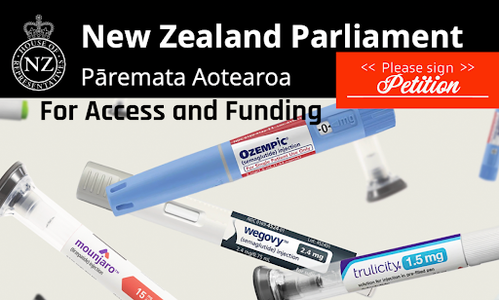Why is this important?
In New Zealand we do not have the same access to pharmaceutical medications as the rest of the world. If we were to have open access, we would be in control of our own lives, and could make choices that could significantly improve health and wellbeing.
We have little power over what potentially harmful compounds are put in our food chain and because of this, obesity is on the rise in Aotearoa, and this is linked to Type 2 diabetes as a result. There are around 100,000 people in New Zealand living with undiagnosed diabetes. The people with a diagnosis of prediabetes if left unchecked risk developing Type 2. Type 2 carries a high risk of comorbidity symptoms, such as hypertension (high blood pressure), obesity, and hyperlipidemia (high cholesterol), and other comorbidities include renal (kidney) disease, retinopathy (vision impairment), and cardiovascular conditions (heart attack and stroke). People with type 2 diabetes may also experience depression and anxiety.
Ozempic, Wegovy, Trulicity, and Mounjaro can make a real difference in people’s lives. Studies and new research demonstrate the long-term effectiveness of these drugs in controlling blood sugar and weight loss. Over 50 percent of type 2 diabetes cases can be prevented or delayed therefore improving our health and wellbeing.
We see the difference it has made in other countries. Please sign the petition so we can help ourselves and our loved ones before they are diagnosed with something irreversible.
Further Reading:
[1] People who have type 2 diabetes have an increased amount of sugar in their blood, also called blood glucose. Increased blood sugar happens because your body’s insulin doesn’t work as well as it should. Ozempic, Wegovy, Trulicity, and Mounjaro help to keep your blood sugar levels from getting too high. In your body, these medicines act like a hormone called GLP-1. It stimulates your body to make more insulin after you eat, prevents your liver from releasing stored sugar, and slows the movement of food through your body.
GLP-1 is a hormone produced by the body's intestinal cells that helps regulate blood sugar and food intake. It's produced when the proglucagon gene is processed in the intestinal endocrine L-cells. GLP-1 is produced in the intestines, pancreas, and neurons. When you eat, GLP-1 triggers the pancreas to release insulin, which helps move sugar from your bloodstream into your cells. GLP-1 also slows down digestion and reduces appetite.
GLP-1 receptor agonists that treat Type 2 diabetes are Semaglutide, Tirzepatide, and Dulaglutide which are all medications used to treat Type 2 Diabetes and obesity. They are glucagon-like peptide-1 receptor agonists (GLP-1 RAs) that help lower blood sugar and body weight. So both semaglutide and tirzepatide work by acting like hormones your body normally makes after you eat. They can make your stomach empty more slowly so that you won’t want to eat again as soon. They also send signals to the brain that tell you you’re full. The main difference is that tirzepatide mimics two hormones while semaglutide mimics one.
[2] A Press New Zealand article quotes “Peter Shepherd, a molecular medicine professor at Auckland University and expert in diabetes and obesity, saying the long-term impact of Ozempic “could be huge” for New Zealanders” Also Associate Professor Hesham Al-Sallami, at the University of Otago, an expert on diabetes and obesity medication, believes if Ozempic or similar medicines were funded in New Zealand, it would take considerable pressure off the hospital system.
[3] “If Ozempic can help patients lose weight, this could reduce the number of people getting type-2 diabetes in the first place,” . “If this drug is made accessible in New Zealand as a weight-loss medication and is funded by Pharmac for that use as well, this could have considerably positive health outcomes for the country, taking pressure off the hospital system by reducing things like heart attacks and strokes.”
References:
Why is this important?
What is Type-2 Diabetes:


